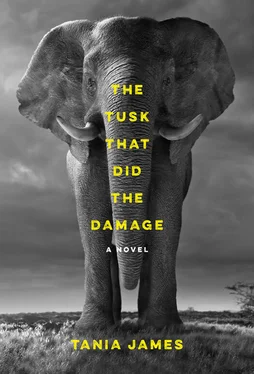“But you told her,” I started and stopped. Still Jayan would not meet my gaze. “Where will you hide it? And if she finds it—”
“Enough questions!” Jayan said. “Why must you always be itching and whining, what if this, why that ? If you are going, then go!”
I looked away, brimming with hurt and fury. Jayan was the type who did not know the difference between humbling and humiliating another. I was fed up with both.
“Then I am going,” I said.
Jayan nodded as if he understood this to be the only way. “Go,” he said calmly this time. “Go safely.”
He offered the rifle, but I refused it. I pretended to remember the route we had taken and promised to carry stones in my fist, lest the Gravedigger should discover me.
“Don’t take chances now,” Jayan said.
Spent of advice, he bit his lip — how like a boy he seemed then! We had no words, and so we simply looked as we had not looked in a very long time. Think of the last time you looked on someone you loved, merely looked without speaking, a face more familiar to you than your very own, a face that holds such mysteries.
“Our guest will be here any minute,” Alias said.
Abruptly I turned and walked away, fleet of foot without the pack. And yet every step felt heavy.
To hunt is to read a hidden language. Inside the forest, I was hunting for a way out. My plan was to take an eastward path, following the kinks of the stream all the way back to the split banyan where the ranger cousin would allow me safe passage. And yet no matter how hard I strained I could not hear the hum of the stream.
I minded the signals: the heaped hill of scat, the sever of a green-hearted branch. I tried not to think of my brother (thereby thinking of him constantly), and thus distracted I lost my footing and snapped a thick twig underfoot. I had snapped several by then, so I thought nothing of it — a sound one would only hear if listening precisely for this.
By now you know: someone was.
I barely saw Ravi in those last few days at the center. The middle ground of friendship was strange and swampy terrain, so we kept to our separate banks. I didn’t think we would ever be pen pals. His e-mails had the brevity of a haiku, the bluntness of a road sign.
As for Teddy and me, something had ruptured between us, irreparably. He went quiet in my presence, ate alone. We skated by on silence and small talk. I told myself some time apart would be cure enough, but deep down I sensed that our friendship wouldn’t survive these final days. Nor would our film.
The day Teddy and I left for Manaloor was a hectic rush of goodbyes. Ravi had insisted on trucking the calves in the evening, which left Teddy and me to fret over the fading light. We filmed the calves trailing the head keeper, Tarun, who backed up the ramp and into the truck bed, dangling bananas. Dev seemed especially agitated, immune to the sedative that Ravi had administered, a shot behind the ear. Only when Tarun lowered his head, allowing Dev’s trunk to fondle his neck, did the calf grow calm.
Once the calves were shut into the truck bed, Ravi stepped back, ducking to catch a glimpse as they nosed the slats, desperately flexing their nostrils. Something in the way he bit his lower lip reminded me of the way Juhi stuffed her trunk tip into her mouth. His theory was that she did it to keep ants from running up her nostrils at night. I thought it was her version of thumb sucking, a means of reassurance. “Always looking for a story,” Ravi had said, not without affection.
Later, I would think of a dozen other ways to say goodbye, jokes about Dev’s soccer stardom or genuine words of gratitude, but when Ravi approached I simply took the hand he offered me — a dry, priestly grip, as meaningless as the handshake he’d given to Teddy.
“Emma Lewis,” he said. He’d never spoken my name before, first and last, tender and taunting, and the sound of it closed the space between us. I don’t remember what I said; all I know for certain is the way he spoke my name, and suddenly it seemed possible that I could return to this very spot, years from now, and all would remain unchanged.
Of course, the illusion lasted only as long as the handshake. As we rolled away, Teddy cranked down the window on the passenger side and adjusted the side-view mirror. It was the perfect parting shot, with Ravi shrinking from view, lost to the swarming green.
In Manaloor, another rescued calf joined the three, a burly number named Bhim. Over the course of two weeks, the calves were taken for daily walks at the edge of the wildlife park, groomed to grow accustomed to the area, taught which berries and leaves to eat. All the calves were fastened with radio collars. Each day, they roamed a bit farther from the rangers, even so far as the watering hole, but always returned.
Teddy let me shoot more than usual during our time in Manaloor, maybe because he knew he wouldn’t be using very much of the footage. It was Teddy who would edit the film, Teddy who would score and sound mix the final cut. At first, we tried to work side by side from his apartment, but by then the bitterness between us had grown roots, and rather than fight him every day for reasons far messier than aesthetics, I withdrew myself from the film. I let him have everything. Another six months passed in a pointless blur, the price of surrendering a whole year of my life.
Five years later, I came across our film at the library. I didn’t recognize the title— Kavanar’s Creatures —but the DVD cover caught my attention, a still of an elephant calf with a shock of orange mohawk. I watched it alone, on a library computer, as if containing the film to a ten-inch window could limit the impact.
There was Ravi. There was Officer Soman sparring with Officer Vasu, keepers feeding calves, and Samina Hakim pressing her lips together with muted fury. There was the dead elephant, its skin peeled back like the pages of a book.
There was no mention of the poacher, an omission that relieved and depressed me. I tried to remember his face from the news report, but it was just one of so many images floating past. I snatched at them, tried to align them with my memories.
Teddy had taken very few of my suggestions, but the one that stands out to me still is the final sequence of the film. In it, we’re tagging along with a beat officer named Vinod. He’s been charged with driving around the park for any sign of the collared calves, who have been vanishing for longer and longer swaths of the day.
One evening, we find the calves on the far edge of the watering hole, where a herd of females is drinking and bathing. It will take the calves another few weeks to detach from their keepers completely. In time, the beat officers will report sightings of Bhim, wandering on his own, while Juhi, Sunny, and Dev are foraging within ten yards of a herd. The officers will find the collars along the elephant routes, ditched like molted skins.
Vinod claims he can see the collared calves through his binoculars, but even through our telephoto lens, zoomed all the way in, the calves are indistinguishable from the rest. They seem twenty-four blots of a single herd that has gathered every evening, for ages, by the lake. And though this feeling has struck me more than once during filming, my heart lifts, open to the world, to the promise of my potential, to the beauty of our making, and I know this is where the film should end. This is it.
Twenty minutes into the forest, I was lost. Each trick my brother had taught me of tracking seemed to bend and blur in my head. What seemed elephant scat one moment seemed bison droppings the next. Did the circular track belong to females and the ovals to males or the other way around? I found a heavy stone — weak defense against an elephant — and upon storing it inside the pocket of my half pant, found something there already.
Читать дальше












